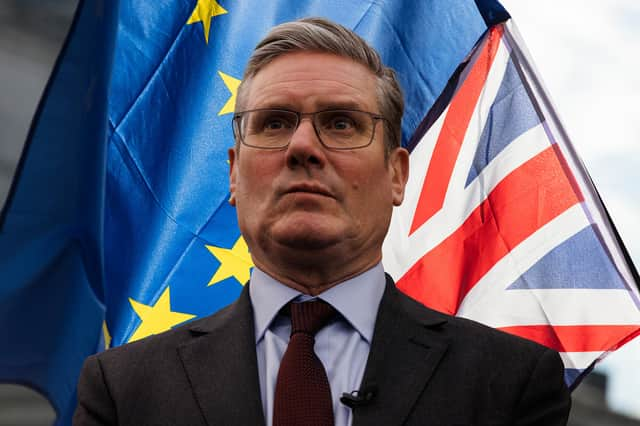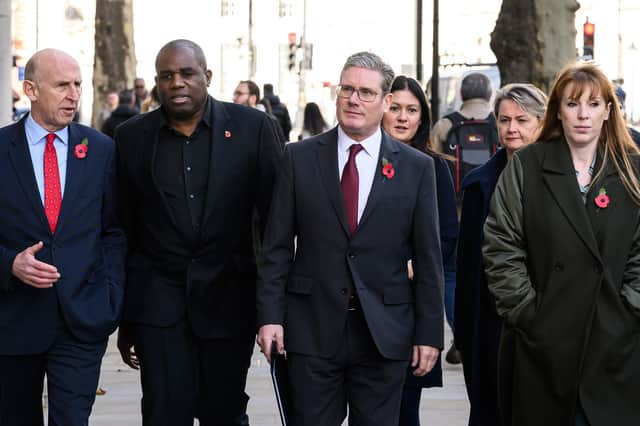Brexit: Labour will struggle to agree new ‘bespoke’ security deal with the EU, report finds
and live on Freeview channel 276
Labour may struggle to agree a new “bespoke” defence deal with the European Union, a new report has revealed.
The research by think tank UK in a Changing Europe (UKICE) has found that foreign and security relations between the UK and the EU could improve under a new government, but may fall short of a tailor-made agreement which Sir Keir Starmer is hoping for.
Advertisement
Hide AdAdvertisement
Hide AdShadow Foreign Secretary David Lammy has said he would prioritise seeking a defence and security pact with the EU, if Labour is elected. He told the I: “It’s our number one priority because it’s our backyard. It’s our number one priority because there is war in Europe and because I believe our future prosperity and security is predicated on good relationships with our European partners."
Lammy was referring to Russia’s invasion of Ukraine, which has shown how global events can push the UK and the EU together following Brexit. If Donald Trump wins the US election, this could further reinforce the shared values of the UK and Europe when it comes to Nato and defence against Russia. Trump has said he would let Russia invade Nato members who do not keep to the 2% of GDP defence spending agreement.


With the Trade and Cooperation Agreement, the post-Brexit trade deal between the two powers, and the Windsor Framework, the majority of defence and security negotiations have been conducted informally.
The current government sees this flexibility as the best option for Britain because it allows it to be “more agile”. In stark contrast, Labour wants to “formalise relations”, with the hope of agreeing a “properly bespoke relationship”.
Advertisement
Hide AdAdvertisement
Hide AdThe UKICE report has found that the EU has well-established models for relationships with third countries, like the post-Brexit UK, for cooperation on foreign and security policy, such as Canada. However, it says: “None of these, however, seem appropriate for a country with the foreign policy and military heft of the UK.”


Prof Richard Whitman, senior fellow at UKICE explained: “Working together closely in supporting Ukraine, the UK and the EU have been reminded that they have a shared view on how to tackle major international challenges. However, being like-minded does not automatically translate into effective cooperation - and both the UK and the EU need to be more creative in finding ways to work together for mutual benefit.”
While director Anand Menon said: “There is - rightly - much talk about shared interests and shared threats. Both the UK and EU will need to think hard about how best to defend the former and react to the other in creative ways in order to ensure that their cooperation is as effective as possible.”
The report states that if Labour form the next government, Starmer and Lammy will be looking for quick wins as opposed to getting caught up in long drawn out negotiations. That may make agreeing the bespoke deal more difficult.
Advertisement
Hide AdAdvertisement
Hide AdJannike Wachowiak, researcher at UKICE, said: "The UK does not currently factor in the EU’s thinking around supporting the competitiveness of its defence industry. This means a deepening of political contacts may well be the most substantive change under a Labour ‘security pact’. A question for both sides should be whether this is sufficient to respond to today’s security challenges.”
Ralph Blackburn is NationalWorld’s politics editor based in Westminster, where he gets special access to Parliament, MPs and government briefings. If you liked this article you can follow Ralph on X (Twitter) here and sign up to his free weekly newsletter Politics Uncovered, which brings you the latest analysis and gossip from Westminster every Sunday morning.
Comment Guidelines
National World encourages reader discussion on our stories. User feedback, insights and back-and-forth exchanges add a rich layer of context to reporting. Please review our Community Guidelines before commenting.
